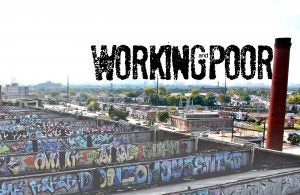Unemployed see faint glints of hope in both candidates’ job-creation plans
Listen 5:59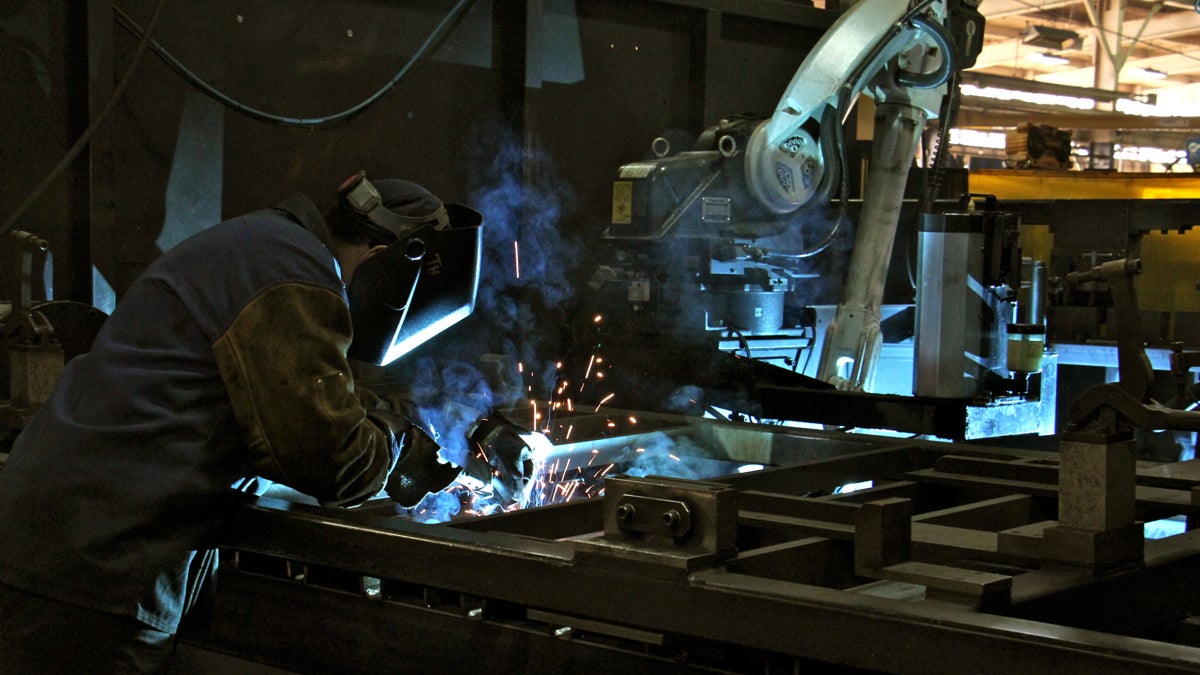
A human welder works beside a robot welder at PTR Baler in Port Richmond. (Emma Lee/WHYY)
Nationwide, about 43 million people live below the federal poverty line. In Philadelphia and the surrounding suburbs, 800,000 people are struggling to make ends meet. In the weeks before November’s general election, we’ll examine how the policies put forth by our presidential candidates would affect them.
—
On one end of the 2200 block of East Ontario Street in Port Richmond, an old brick factory that once made imitation leather sits dormant, a symbol of urban decay in a Philadelphia ZIP code where nearly half live in poverty.
But just down the block, men in blue jumpsuits smeared with grease are hard at work at a factory called PTR Baler.
Inside, plant manager Bob Walker is giving a tour to a group of middle-schoolers, shouting slightly over the constant clanging of machinery and the crackling sound of welding.
“Whatever you guys do and girls, do not look at the blue light,” Walker warns the students as he ushers them past a robot welding large pieces of steel used in recycling and trash compactors for Target, Wal-Mart and other big-box stores. Bright yellow sparks fly into the air through a glow of blue light as the robot arm works the metal.
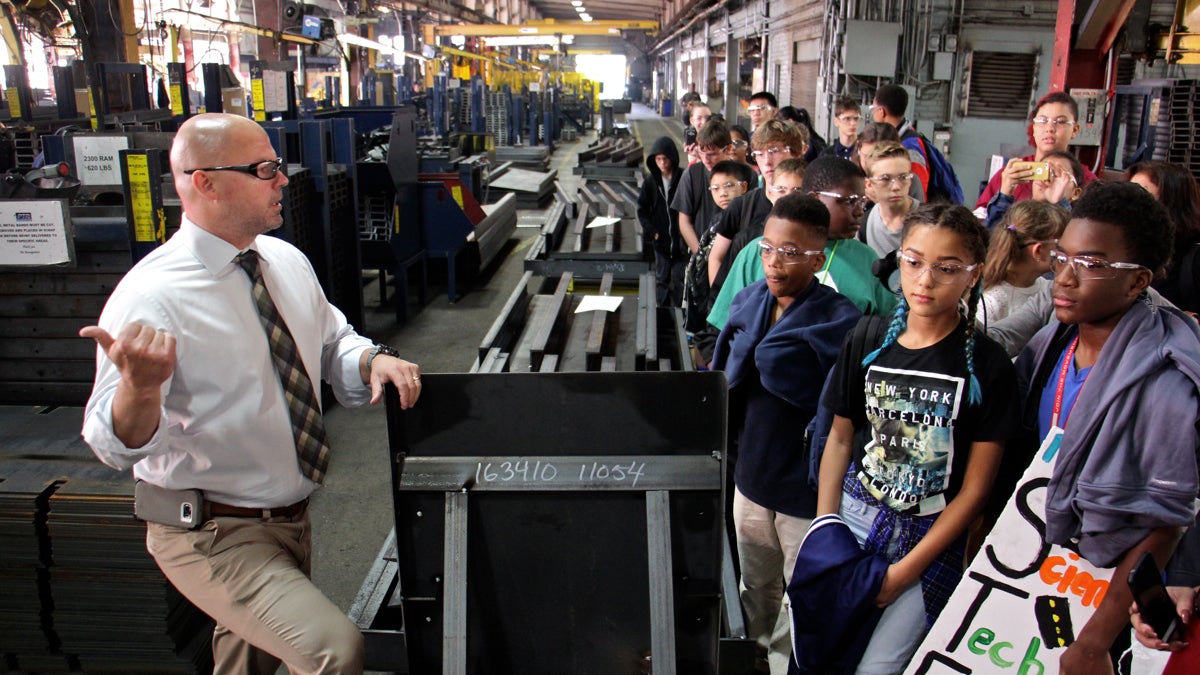
“This used to take us about 90 minutes to weld that by hand, now we’re welding it in 27,” he says.
Walker has worked at PTR Baler for 29 years, since he was 17 and fresh out of high school.
In that time, he said, the company has grown from 40 employees on the factory floor to more than 140. And that hasn’t happened in spite of incorporating more automation like that robot. Rather, Walker said, that growth has happened because of it.
Doing the math
It used to take Walker’s workers 50 hours to build one baler for Wal-Mart. Now, thanks to some new tools and a more efficient manufacturing process designed by his engineering department, he said it takes them 38 hours.
“With that combination, we’re able to discount the baler, so we could actually get the work,” he said. “Once we got the work, it was such a large amount of work, we had to hire people. I just got out of the meeting last night, they want me to hire 10 more men because of all the work.”
While manufacturing production has been on the rise in Philadelphia and across the country, the number of workers needed to make things has dropped significantly.
Back in 1970, one in three Philadelphians worked in manufacturing. Today, it’s one in ten.
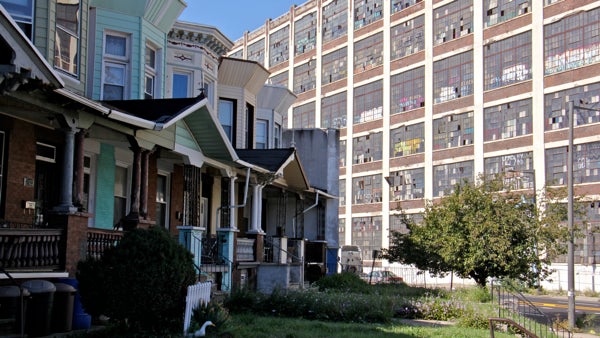
The loss of manufacturing jobs is a major reason why more than a quarter of Philadelphia residents live in poverty. Starting as early as the 1920s, factories that gave Philadelphia a reputation as “Workshop of the World” began moving out to other parts of the country or overseas — destabilizing the neighborhoods that had grown up around them.
According to a city report from 2013, three-quarters of manufacturers in Philadelphia have fewer than 20 employees.
That’s what makes PTR Baler so unusual.
“I think we’re a dinosaur here,” said Walker. “We’re heavy manufacturing, and there’s not a lot of these companies left in the city.”
‘Jobs, jobs, jobs’
In the 2016 presidential election, Hillary Clinton and Donald Trump have made big promises to bring those good-paying manufacturing jobs back, especially as they tour Pennsylvania and other rust belt states.
Republican Trump is vowing to lure companies back to American soil with tax cuts, scaled-back government regulations and renegotiated trade deals.
“My economic agenda can be summed up in three such beautiful words — jobs, jobs, jobs,” Trump said at a recent rally in Manheim, Lancaster County.
Democrat Clinton has pledged major investments in manufacturing, infrastructure and clean energy in hopes of sparking an economic renaissance, which she calls “the biggest job creation program that we’ve had in this country since World War II.”
Walker at PTR Baler won’t say who he’s supporting for president, but he likes the idea of the government pressuring manufacturers that have moved their operations overseas — something both Clinton and Trump have proposed.
“Now, I drive around, and I see vacant buildings,” he said. “I’m hoping, some day, the president switches it around a little bit and puts some burden on the overseas stuff to where it actually makes sense to build here.”
‘Who makes the picks and the hammers?’
But if these companies did come back to Philadelphia, would they bring the kind of jobs the more than 400,000 residents living in poverty could fill?
Tim Styer, a job counselor at the Philadelphia Unemployment Project, would know.
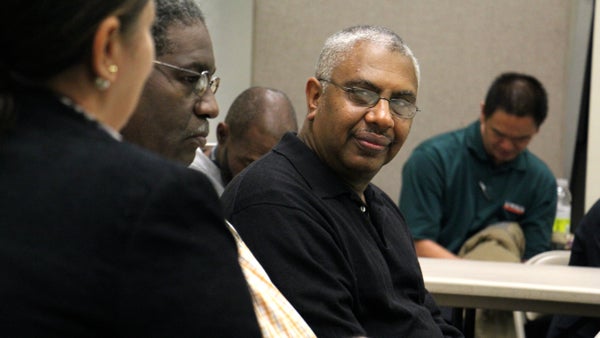
He helps about 400 people a year look for work. Many don’t have college degrees and have had trouble finding a job since the recession or, frequently, since getting out of prison.
“I call them the leftovers,” he said. “People who say, ‘I worked all my life, I worked in a factory … I’m 55 years old, and all I have is a high school diploma, and nobody wants to hire me.'”
From the tiny office on North Broad Street where Styer sits, the problem is not that there aren’t enough jobs available or that people lack the aptitude necessary to fill them.
The problem is they don’t have the specific training they need — especially as jobs require more technical skills. That goes for manufacturing, as well as jobs in Philadelphia’s booming “eds and meds” field.
But Styer seems unflappably optimistic. One of his clients — a guy named Leonard — is currently enrolled in a math refresher course so he can get a job in the energy industry in Marcus Hook, Delaware County.
“We’re saying, ‘Maybe he doesn’t have all the skill sets, but we’ll train him and get him ready for the job,'” Styer said.
And he insists that, in Philadelphia, there are more people like Leonard than not.
When it comes to the presidential race, Styer thinks Clinton has been clearer about what today’s jobs demand and the kind of training workers need to fill them, while Trump is clinging to a past that won’t return.
“Before it was more neck-down work, using your body and lifting and all — it’s not like that no more,” he said. “A lot of it is more neck-up stuff … Where you got another candidate saying, ‘We’re gonna put picks and hammers in your hands again.
“Who makes them? Who makes the picks and the hammers?”
‘You gotta know somebody’
That’s something many of Styer’s clients also have to come to terms with.
Avery Siplin recently stopped by the jobs club Styer hosts every Tuesday — it’s like a group therapy session for people struggling to find work.
For more than 20 years, Siplin was a welder for the Budd Company — which made roofs, doors, and fenders for Ford, Chrysler and other automakers at a giant manufacturing complex in the Hunting Park neighborhood of North Philadelphia. The company was one of the city’s largest employers for most of the 20th century.
“You could come right off the street … and start off at $14 an hour,” Siplin said. “And then, after couple years, $16, $17 an hour.”
But in 2002, the Budd Company closed its Philadelphia factory, leaving 600 workers out of a job, including Siplin. He managed to find a job with another manufacturer in the suburbs for eight years until that plant moved too far for him to commute by public transportation.
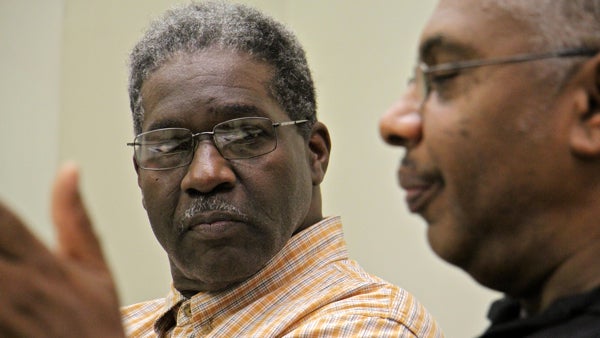
While searching for work, the 67-year-old has had a lot of time to watch the presidential campaign on TV. When he hears Clinton and Trump talk about jobs, he’s skeptical.
“They don’t talk none specific about how they gonna get these jobs,” he said.
“‘Cause all the jobs, and that’s another thing —,” Siplin cuts himself off to say that after the Budd Company closed down in Philadelphia, it consolidated operations in Detroit. Three years later, it opened a new plant in Mexico and, in 2006, Budd shut down its factory in Detroit.
Siplin thinks if companies can continue to get cheaper labor in other countries, there’s nothing a president can do to change that — even a President Trump.
“I don’t see how he’s going to do that, how he’s going to threaten ’em,” he said.
As for him, Siplin has accepted he won’t find a job like his old one. He’s getting by on his Social Security check and his pension from the Budd Company, but doesn’t have enough flexible income to enjoy his retirement by traveling or taking a trip. That’s why he’s looking for work, but it’s not as easy as it used to be.
“You can’t walk off the street now,” he said. “You gotta know somebody.”
WHYY is your source for fact-based, in-depth journalism and information. As a nonprofit organization, we rely on financial support from readers like you. Please give today.


